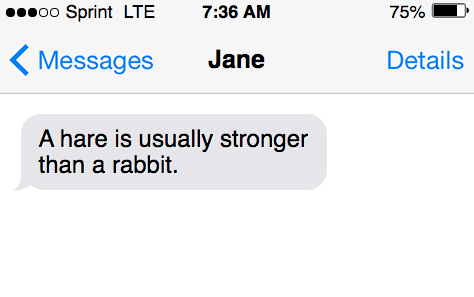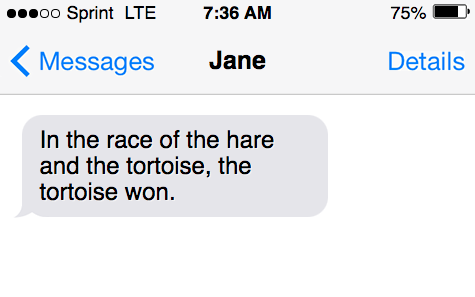Bunny, Rabbit, or Hare. Sometimes, animal names in the English language get a bit confusing. Today, we take a look at three words that are more or less used interchangeably. Although, they shouldn’t be, as they mean different things.
So, let’s take a look at what the words “bunny”, “rabbit”, and “hare” mean…
What is a “Bunny?”
A bunny is not a scientific name for a species. It’s more of a nickname given to young and/or small rabbits. So, it’s best to avoid the use of this word in formal and academic settings.
Of course, in English, bunny is a pretty popular word. And if you’re engaging in a casual conversation and want to refer to a baby rabbit, you should use the word “bunny”.
The popularity of this word is evident in the name of the hit children’s cartoon “Bugs Bunny”.

What is a “Rabbit?”
Another noun, but a more scientific one that can be used in formal in academic settings. Rabbits are members of the Leporidae family. These are small mammals with large ears, strong back legs that helps them hop, and they make for a good stew.
It’s noted, however, that the words “Hare” and “Rabbit” are not synonymous. A common mistake is to use these words interchangeably. Rabbits are a different species from hares even though they look more or less the same.

Difference between “Bunny” and “Rabbit” and “Hare”
The major difference between a hare and a rabbit is that they are completely different species. Hares are larger with bigger and longer ears. Moreover, hares also have longer and stronger hind legs. Rabbits live underground in groups of up to 20. Hares, on the other hand, prefer to live above the ground in makeshift nests, and they prefer to live in pairs.
Another important fact to note is that when rabbits are born, they don’t have fur and are blind. They have to be protected, as they make for easy pickings for predators. Thus, they spend the early days of their life in a fur-lined nest. Baby hares, on the other hand, are born with fur with eyes wide open. Thus, you can easily figure out if a youngling is a baby rabbit (bunny) or a baby hare.

It can be confusing, of course, and language is often tricky. For instance, jackrabbits are actually hares and not rabbits. On the other hand, swamp hare is a kind of rabbit. Names can be misleading.
This brings us to the question, what exactly is Easter Bunny? Is he really a rabbit, or a hare? Well, the evidence points to the fact that he might actually be a hare. The word “Hare” predates the word “Rabbit”, as the former comes from Old English.
“Rabbit” comes from French and its origin can be traced back to the 14th century. “Easter Bunny” comes from “Easter Hare”, which was a direct translation of “OsterHase”, originally a German tradition. And “Hase” means hare. Thus, easter bunny is actually a hare.

Fun fact: One last interesting thing to note – Eminem, the famous rapper, had a nickname during his initial days – “Bunny Rabbit” or “B-Rabbit.”
When to use “Bunny”?
Here are some sentence examples to help you understand the proper usage of “bunny”.
Sentence Examples
1: Children, the Easter Bunny does not exist, just like Santa. (Don’t say this to them!)
2: How lovely would it be to have cute little bunnies as pets.
When to use “Rabbit”?
Wondering how to use the word “Rabbit” in a sentence. Here are some examples.
Sentence Examples
1: Rabbit stew is my favorite dish.
2: Martha is out there playing with rabbits.
When to use “hare”?
Now, let’s see how we can use the word “hare” in sentences.
Sentence Examples
1: A hare is usually stronger than a rabbit.
2: In the race of the hare and the tortoise, the tortoise won.
How to remember which form to use?
In the end, it becomes quite easy to remember the difference between bunnies, rabbits, and hares. Here are the pointers that will help you remember:
- Bunnies are baby rabbits (bare, naked, helpless, blind)
- Rabbits are a completely different species than Hares.
- Rabbits are smaller, weaker, live in large groups underground
- Hares are bigger, stronger, live in pairs above the ground
- Easter Bunny is actually a Hare (and was originally German)
- Bunny is a colloquial term. Not used in formal and academic settings. Therefore, you can just call any rabbit or hare a bunny and no one would mind. But it’s best to remember the differences.
Inside this article
Fact checked:
Content is rigorously reviewed by a team of qualified and experienced fact checkers. Fact checkers review articles for factual accuracy, relevance, and timeliness. Learn more.
Core lessons
Glossary
- Abstract Noun
- Accusative Case
- Anecdote
- Antonym
- Active Sentence
- Adverb
- Adjective
- Allegory
- Alliteration
- Adjective Clause
- Adjective Phrase
- Ampersand
- Anastrophe
- Adverbial Clause
- Appositive Phrase
- Clause
- Compound Adjective
- Complex Sentence
- Compound Words
- Compound Predicate
- Common Noun
- Comparative Adjective
- Comparative and Superlative
- Compound Noun
- Compound Subject
- Compound Sentence
- Copular Verb
- Collective Noun
- Colloquialism
- Conciseness
- Consonance
- Conditional
- Concrete Noun
- Conjunction
- Conjugation
- Conditional Sentence
- Comma Splice
- Correlative Conjunction
- Coordinating Conjunction
- Coordinate Adjective
- Cumulative Adjective
- Dative Case
- Determiner
- Declarative Sentence
- Declarative Statement
- Direct Object Pronoun
- Direct Object
- Diction
- Diphthong
- Dangling Modifier
- Demonstrative Pronoun
- Demonstrative Adjective
- Direct Characterization
- Definite Article
- Doublespeak
- False Dilemma Fallacy
- Future Perfect Progressive
- Future Simple
- Future Perfect Continuous
- Future Perfect
- First Conditional
- Irregular Adjective
- Irregular Verb
- Imperative Sentence
- Indefinite Article
- Intransitive Verb
- Introductory Phrase
- Indefinite Pronoun
- Indirect Characterization
- Interrogative Sentence
- Intensive Pronoun
- Inanimate Object
- Indefinite Tense
- Infinitive Phrase
- Interjection
- Intensifier
- Infinitive
- Indicative Mood
- Participle
- Parallelism
- Prepositional Phrase
- Past Simple Tense
- Past Continuous Tense
- Past Perfect Tense
- Past Progressive Tense
- Present Simple Tense
- Present Perfect Tense
- Personal Pronoun
- Personification
- Persuasive Writing
- Parallel Structure
- Phrasal Verb
- Predicate Adjective
- Predicate Nominative
- Phonetic Language
- Plural Noun
- Punctuation
- Punctuation Marks
- Preposition
- Preposition of Place
- Parts of Speech
- Possessive Adjective
- Possessive Determiner
- Possessive Case
- Possessive Noun
- Proper Adjective
- Proper Noun
- Present Participle
- Prefix
- Predicate



